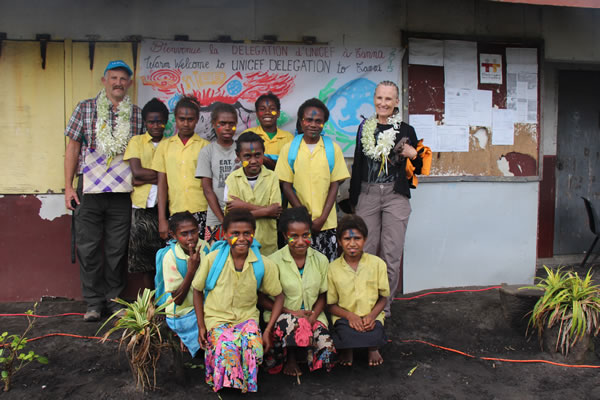The donations from New Zealand – both private and from our government – to the Cyclone Pam relief and restoration in Vanuatu have been significant. A window on how that money has been applied is not only deserved by those who donated, but essential to ensure continual improvement in our aid efforts in future.
The mechanism of my wife Joanne’s and my involvement, as has been for several years now and though a number of emergency and development crises, has been via UNICEF. We chose UNICEF as our preferred partner for a number of reasons
- it is not religious so does not have a confused agenda
- it is large and with emergency responses particularly, scale provides a better value for money
- it is experienced and has learnt many of the lessons
- it focuses on women and children who so often in these recipient countries are the people that suffer most and are the first to be locked out from assistance
- it works with host governments, indeed does not operate in countries where the host government doesn’t partner. The rationale for this is simple – in order to ‘make things happen’ cooperation of the local bureaucratic and political wings of government are necessary.

By no means is the UNICEF model the only valid model of providing assistance and ensuring pledges to donors are honoured. There are other major agencies that would suit particular donors’ needs more I’m sure. Joanne and I sponsor many other small ‘hands-on’ social and economic investments in the developing world and they all have their place. For sure the success is more varied in that space and I would posit the success rate is significantly lower, but we’ve experienced efforts that do work and been involved with several of those that are just outstanding.

With the Vanuatu emergency initiative the New Zealand donor money to UNICEF has been allocated primarily across education and health. The focus in education has been in getting emergency supplies to the schools so they can get back up and running as soon as possible (tents, school supplies via the ‘school in a box’ installations for instance). In addition, frightened children have had to be encouraged to return and a wide distribution of backpacks with school supplies for children has been outstandingly successful. With health the response has been similarly to get roofs back on and health clinics back into operating mode. This involves replenishing supplies as well as ensuring health personnel remain on the job – with stretched resources the local government has had to make difficult choices in that regard and UNICEF has stepped in to pay some salaries. Vanuatu has only 30 doctors (1 per 9,000 people as opposed to New Zealand’s 1 per 30 people) so training and deployment of nurses and paramedics is far more critical in the islands.
In addition UNICEF has used its logistics prowess to effect the distribution of supplies from many agencies around the world to where the need is greatest in Vanuatu. That’s particularly difficult given the 80 islands in the group.

Then there’s the efforts of the New Zealand government – also very substantial and ranging from the deployment of our military assets to effect the first responses, and ranging right through to efforts pending to re-establish the port infrastructure in Port Vila to enable the cruise ship and freight businesses to re-establish and grow. Tourism assets appear to be pretty much back in place and from what I saw, tourism should be (although it’s not) pretty much back to full health. This is a crucial business for the country and expanding it is one way to accelerate the economic recovery.
So in summary New Zealand can rightfully feel proud of efforts made and the role played by our respondent agencies. Yes there are lessons to learn for sure, and too many that are specific to this particular recipient country so cannot be generally applied. The last natural disaster here was in 1987 (and that was just a Category 3 cyclone) so memory loss is significant. Ominously the prediction is that a Category 5 cyclone can be expected somewhere in the Pacific every 12 months from now on, so as much as possible the lessons from Pam need to be incorporated in the response culture for the whole region.


